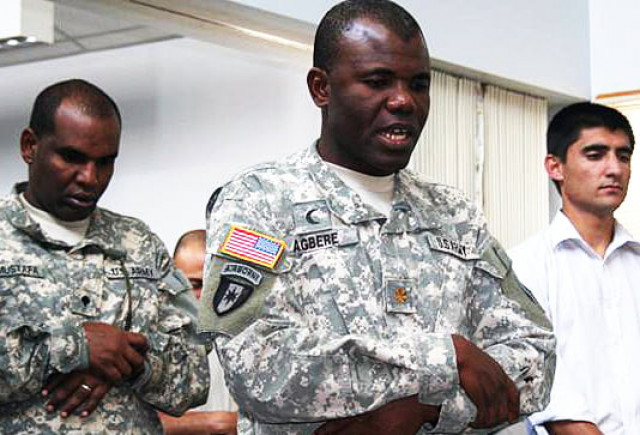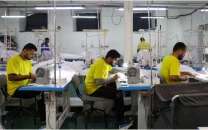The Muslim US army imam bridging cultural gap between Islam and West
The prayer service at Pentagon is led by Dawud Agbere, one of five Muslim Army imams

Dawud Agbere leads other assigned Muslim Soldiers in prayer as they prepare for the beginning of Ramazan. PHOTO: US ARMY
Agbere leads the afternoon prayer service inside the Pentagon's 9/11 memorial chapel, the building which was attacked by terrorists nearly 15 years ago, to give fellow Muslims a chance to connect with their Creator.
'You have sacrificed nothing and no one': Father of Pakistani-American war hero to Trump
Having served in the US military for nearly two decades, Agbere is not a typical US army Lieutenant Colonel. His army career has taken him to war zones in Afghanistan and Iraq. As a fluent Arabic speaker and oftentimes the only Muslim in his unit, Agbere says he works to 'bridge the gap' between cultures. According to him, many in the allied armies he worked with "never fathomed they'd see a Muslim in the US army. Then they see one; they are shocked."
 Dawud Agbere, stationed at the Pentagon, is one of five Muslim Army imams. Photo: US Army
Dawud Agbere, stationed at the Pentagon, is one of five Muslim Army imams. Photo: US ArmyAbdul Zaid, an IT contractor who works in the building, calls Agbere a spiritual leader who cares, consoling his fellow Pentagon employees during times of grief and occasionally taking them for cookies or ice cream in times of celebration.
Hillary Clinton shuts down Trump with touching tribute to US Muslim war hero
Born and raised in the West African nation of Ghana, Agbere won the US Diversity Visa lottery, which randomly selects immigrants from countries with historically low rates of immigration to the United States.
He eagerly accepted the visa and got a job teaching high school students in New Jersey, but after months with the unruly students, he yearned for a job with more discipline and order. "So when I saw the navy was hiring people, I said, ‘That's where I belong,'" Agbere said.
 PHOTO: US ARMY
PHOTO: US ARMYHe went to boot camp with the navy until he discovered he could not become an officer without US citizenship. Rather than make him wait, his superiors allowed him to switch to the army, which did not have the same restriction.
His journey has not always been easy, though. When he was deployed in Iraq, one of Agbere's military leaders was extremely apprehensive of him even before they met. "He had his own misconception about who that Muslim guy is going to be," Agbere said, "but today, he's one of my best friends."
Pakistani family sues New York school, alleging forced 'terrorist' confession
 PHOTO: US ARMY
PHOTO: US ARMYIn this time of rising Islamophobia in the US, he says he doesn't judge those who criticise Islam, choosing instead to point out the 'beauty' of American diversity.
"Definitely some of these things are based on ignorance, and I always see this as an opportunity to teach people," he said. "I want to be able to define my story. I don't want my story to define me."
This article originally appeared on VoA.



















COMMENTS
Comments are moderated and generally will be posted if they are on-topic and not abusive.
For more information, please see our Comments FAQ